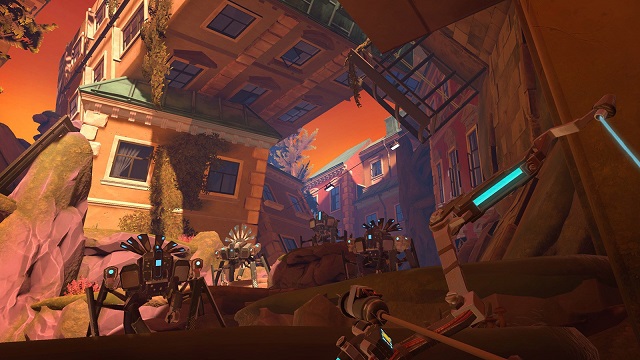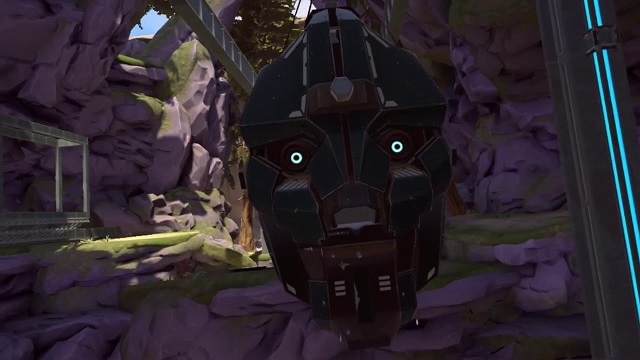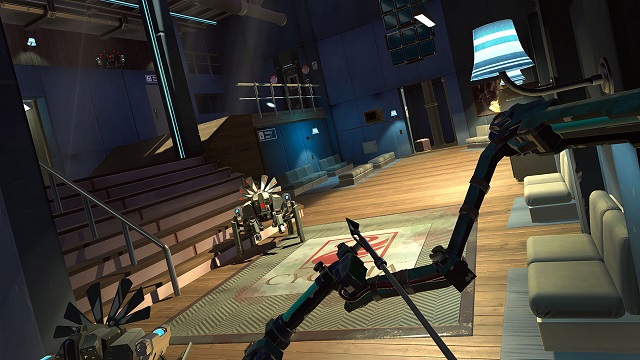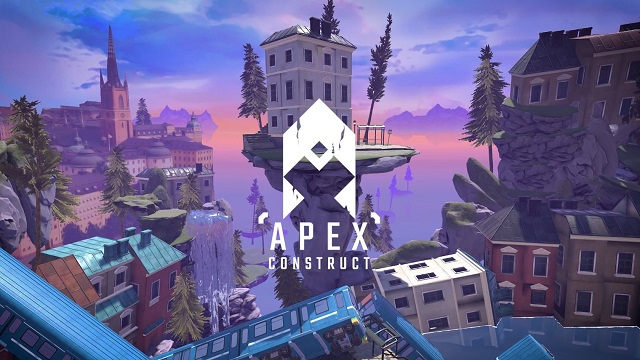Apex Construct is one of the few games currently on the Oculus Store that offers players a full experience that actually, well, feels like a full experience. In fact, it’s one of the few single-player VR titles that serves up an interesting, well-paced story alongside compelling gameplay mechanics and fantastic sound design. It leverages some of VR’s best elements to create a fun, memorable experience.
It’s a shame, then, that however beautiful and fun the game is, it’s marred by pesky bugs and uninspired mid- to late-game repetition. In some ways, Apex Construct still operates like an Early Access title; it doesn’t feel as polished as it should despite its breadth and scope. For $29.99, I expect a little bit more refinement from a VR game like Construct. That tarnished feeling grows even more pronounced when you consider games like Robo Recall and Sairento VR command the same price and offer up what amount to more balanced experiences.
I suppose the disappointment that grows out of Construct‘s imperfections is amplified by its potential. In so many ways it stands on the cusp of greatness — Construct shows what a VR-focused action/adventure game can truly achieve when developers get things right. The game pulls back the curtain of VR’s optimistic future to show us something beautiful — but it quickly drops the veil just as we’re taking everything in, cutting us off from the radiance within.

The world of Apex Construct is one of my favorite things about the game. Despite its post-apocalyptic trappings, it’s immediately inviting. No, it’s not the most beautiful VR game I’ve played on the Oculus, but it does stand out as unique and wonderful.
Running the game on a beefier rig powered by a GTX 1080 8GB, an i7-7700K 4.2GHz, and 32GB of RAM, Construct was never as crisp as games like Robo Recall at higher settings (although it looks absolutely gorgeous watching someone play it on an AOC AG322QCX). I often found there was a graininess to objects or that edges weren’t as refined as they ought to be while in the headset itself.
But what’s really worth spending time talking about is the feel of Construct’s world, not necessarily its look.
Apex Construct feels desolate and devoured. Robots run this world where the memory of man is but a shadow. Eerie and moody, it accentuates isolation and doubt not only through story but by virtue of contrasting level design. Wide-open areas funnel into tight, claustrophobic corridors, while bright, vibrant colors melt into dark, brooding pantones — and back again — reflecting the disunion of the human psyche in this upside down world. Construct is on the surface an inversion of Sarah Connor’s SkyNet prophecy. It’s painted as a colorful, cheery world, but dig under its prismatic facade and you’ll find a grungy evil lurking beneath, one that might be just as terrifying as any T-1000 could ever be.
So even though Apex Construct isn’t a horror game, the elements of its world coalesce into a subtle, creeping dread as you learn more about why you’re here and who brought you into this world. As you’re slowly trapped between two sentient AI vying for control of everything around you, your interactions with them — and in-world storytelling devices such as notes and data logs — make you question everything you’re told.
It’s not revolutionary storytelling by any means, but it’s a tick forward for storytelling in VR.

If you’ve seen any of the trailers or press materials for Apex Construct, you probably already know combat revolves around the bow. In fact, it’s the only real weapon in the game. You have access to grenades, but those are mostly ineffectual and cumbersome when robots attack, especially in the late game when shields get more involved.
However, just because the bow is your only choice doesn’t mean it’s a bad one; there’s a reason the recurve family continually shows up in VR games. When developers get the mechanics right, there’s no better feeling than notching an arrow, pulling it back, and letting it fly. And for the most part, Apex Construct nails that.
As you progress, you’ll gain access to three different arrow types (standard, electric, and explosive) which all have specific uses against enemies and in the environment. Electric arrows are perfect for disabling shields or activating out-of-the-way panels. And explosive arrows work well for taking down enemies faster or breaking through fragile walls. It’s worth noting that the recharge system for electric and explosive arrows can get a bit grating later in the game, especially when multitudinous shielded robots inundate the screen. But overall, I found not having infinite arrows across the board added strategy and consequence to each and every shot.
However, as good as loosing arrows feels, it’s a serious bummer when the core system doesn’t work. At times, arrows will bounce off enemies for no reason at all. At other times, they’ll fly right through foes, causing no damage at all. On top of that, I sometimes found that the on-bow shield didn’t block every shot roaring toward my face — and it wasn’t always as quick to activate as I would have liked.
But those are nitpicks compared to the most egregious and irritating issue I ran into: when arrows just wouldn’t notch. While it did happen when standing in an open room, it was especially noticeable when taking cover against a wall or pylon. If arrows did notch in these situations, they wouldn’t pull back, forcing me to move positions and potentially enter the line of fire.
The issues were so persistent in the mid-game that I thought my touch controllers were dying or that my sensors weren’t correctly picking up my movements. But booting up Robo Recall and SUPERHOT VR proved otherwise. Couple that issue with Construct‘s rudimentary and sometimes frustrating experience system — which sees you lose all level XP upon death — and it’s a safe bet you’ll find yourself in quite a few frustrating situations.

Ultimately, I want to rate Apex Construct higher. The game does a lot of things right and shows what a single-player VR experience should be in terms of narrative design and world building. Fathr and Mothr give System Shock‘s Shodan a run for her money. Couple that with a (mostly) beautiful world, refined voice acting, and well-paced writing, and you’ve got the formula for success.
It’s just that Apex Construct has a few issues that are hard to get over. Aside from the aforementioned arrow irritability, the game’s equipment system isn’t always responsive, meaning actually equipping arrows when you need them can be a chore under heavy fire. Mid- to late-game levels are simply rehashed early-game levels with new objectives. And there can even be issues with your inventory reflecting your in-game progression. From experience, I can say spending an hour looking for Level 2 keycards because your current Level 1 keycards don’t update as they should isn’t exactly fun.
When Apex Construct plays nice, it’s an invigorating experience. Despite my disdain for what it does wrong, I actually had a blast playing it — and that’s really what matters, I suppose. With a little more polish, this is a game that could have truly shined. But as it stands, it’s a fun experience that wanes in brilliance once you’re finished.
You can buy Apex Construct on Steam for $29.99
[Note: The developer provided a copy of Apex Construct for review.]







Published: Mar 27, 2018 01:45 pm